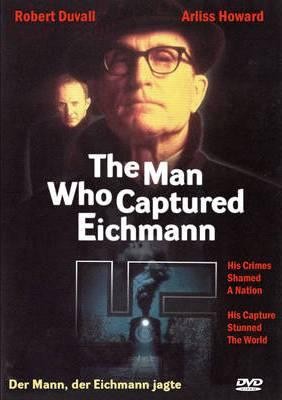
THE MAN WHO CAPTURED EICHMANN
US, 1996, 95 minutes, Colour.
Robert Duvall, Arliss Howard, Jeffrey Tambor.
Directed by William A. Graham.
The Man Who Captured Eichmann is a Turner telemovie, based on the biography of the man who captured Adolf Eichmann in 1960 in Argentina. The film shows the training of the team, the staking out of Eichmann and his life in Argentina, the capture, the holding him in Argentina to try to get information, the transfer to Israel and the beginning then of one of the court cases of the century.
This theme has also been treated in The House on Garibaldi Street and the trial in The Man in the Glass Booth, written by Robert Shaw, with Maximilian Schell.
While this film shows the action sequences in the taking of Eichmann, most of the drama is in conversations with Eichmann who shows himself to be very restrained in his manner, acting civilly, defending himself against all guilt, merely being an administrator of the transport to the concentration camps. Robert Duvall gives a controlled performance as Eichmann. Arliss Howard is the man who captured Eichmann.
1.Interesting telemovie? Audience understanding of the concentration camps and the Holocaust, the role of the Nazi leaders, especially Eichmann?
2.Eichmann and the Nazis escaping to South America and living safely in Argentina until the '60s? Escaping detection? The state of Israel and Mossad and their concern about capturing war criminals, especially Eichmann?
3.The Argentinian settings? Buenos Aires in the '60s? Military rule? Israel, Mossad? The musical score?
4.The title and its being based on an autobiography? The portrait of Peter Hasim? His personality, background of his sister being killed in the camps, his relationship with his mother? The motivation for getting Eichmann?
5.Robert Duvall as Eichmann, being seen as the loving grandfather, the concerned father, holidays, wedding anniversaries? His meticulous routine? The comment on the way he walked - military? His being able to live with what he did in the war? The glimpse of his wife, his children and their attitudes? The preparation for taking him? His initial reactions, his being polite, referring to his captors as "Sir"? The discussions with Peter and upsetting him? His explanation of his role, the transport? His not having responsibility? His basic attitudes - and the preparation for his going to Israel for his trial?
6.Peter and his self-assurance, attitude towards the others in Mossad? Wanting to control the operation? His visit to his mother? The delay at Customs, in Buenos Aires, the clash with Hans and who was running the operation? His plan, its execution? The wrong bus? The split-second timing? His looking after Eichmann, a certain respect, yet disgust? Forcing him to eat? Being upset by Eichmann's not taking responsibility? Rose and her coming to cook, his weeping in the night? The further interrogations, the preparation to go to Israel, the transfer to Israel and the beginning of the court case?
7.The other members of the team, Hans on the spot and finding out the information? The blind man and the smells which led him to remember Eichmann? The controls, the work of the team? Holding Eichmann for some time in secret, interrogating, feeding him?
8.The Argentinian authorities, collaboration with the family, the investigations and suspicions?
9.The film asking its audience to think back over World War II, the role of the Nazi leadership, the extermination of the Jews, the concentration camps? The horror, the responsibility? The role of Israel in seeing justice done? Eichmann finally hanged for his crimes?